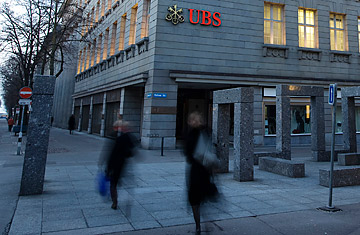
The Swiss Bank UBS in the Bahnhofstrasse in Zurich
Pick a dictator, almost any dictator — Cuba's Fulgencio Batista, the Philippines' Ferdinand Marcos, Haiti's Papa and Baby Doc Duvalier, the Shah of Iran, Central African Republic Emperor Jean-Bédel Bokassa — and they all have this in common: they allegedly stashed their loot in secret, numbered accounts in Swiss banks, safely guarded by the so-called Gnomes of Zurich. This association — of bank secrecy and crime — has been fed into the public's imagination by dozens of books and movies. It's a reputation that rankles the Swiss, who have a more benevolent view of their commitment to privacy — one that happens to extend to tax privacy. Don't ask, because we won't tell.
But the dramatic federal investigation of Switzerland's UBS has blown the lid off bank secrecy — and revealed how Swiss banks abet tax evasion on a far more widespread, if more banal, level. Over the past two decades, these secret banking services have been peddled progressively downmarket — first to the lesser-known fabulously wealthy, then to just the wealthy; more recently, private bankers have been tripping over themselves soliciting business from doctors, lawyers and other folks who are what the biz generally calls "high net worth" individuals. "The IRS has been concerned for decades that a combination of a global economy, the Internet, offshore banking, was really going to take offshore tax evasion from the old so-called 'gentlemen's sport' to tax evasion for the masses," says Mark Matthews, a former deputy IRS commissioner and now a tax attorney with Morgan, Lewis & Bockius LLP.
The federal investigation into UBS, which led to a $780 million fine and an agreement to turn over the names of more than 4,450 suspected tax cheats, is now in tatters after Swiss courts ruled against the executive-branch deal. To get around it, a special law has been proposed to accomplish the handoff, but that may not get anywhere in the legislature either. One outcome is already known: tax evasion had become a key service of the Swiss economy, not some isolated event. "They have been outed completely because a very large chunk of their business has been shown to include people cheating on taxes," says Jack Blum, a tax-haven expert. Being "reasonably conservative," he estimates 30% of Swiss banking is related to tax evasion, a figure that jibes with recently released bank data.
These revelations come as the financial meltdown has punched a huge hole in projected revenues for governments, which are suddenly a whole lot less tolerant of tax cheats. That's particularly true in Germany, whose wealthy account for a significant portion (at least 10%) of the $1.8 trillion in Swiss banking assets. That translates into hundreds of millions in lost revenue and is the reason the German Finance Minister recently thundered, "There's no future for bank secrecy. It's finished. Its time has run out." The Swiss are not going to be so easily convinced. The Swiss government has already warned that it will not cooperate with German authorities if they go ahead with plans to purchase purloined data about Germans with Swiss bank accounts.
The Swiss have a reason to be protective: the financial industry has afforded the small nation an enviably high standard of living, with massive capital inflows propping up its currency (the Swiss franc), making imported goods relatively cheaper. That's why maintaining bank secrecy has effectively been national policy for decades. As a Senate investigator, Blum got a taste of that when he tried to question a European representative for American companies in Switzerland who was suspected of commercial bribery. "I was personally warned by the Swiss ambassador that if I tried to talk with anyone about money hidden in Switzerland I'd be arrested," he recalled. "People understood that's where the hot money went."
Over the years, the Swiss government has also skillfully doled out intelligence dollops to its American counterparts to keep the U.S. government from pressing too much. That may have been one reason recently retired Manhattan district attorney Robert Morgenthau, who had butted against Swiss bank secrecy repeatedly since the 1960s, was not able to make many cases. The federal government is more earnest than ever, he says, but the resolve comes when the locus of tax evasion has already shifted to other havens. "Switzerland is not the No. 1 problem any more. The Caymans is the biggest problem," he says.
Still, recent reports demonstrate that bank secrecy is still very important for Switzerland and suggest how Swiss banks intend to maintain that secrecy for years to come. Credit Suisse, which took a net capital outflow hit of $5.5 billion in the fourth quarter of 2009, reported it had about $100 billion of private, cross-border assets from politically sensitive or tax-sensitive countries. But when stress tested in simulations of widespread tax amnesties, it showed that $25 billion to $35 billion might flee. That sounds huge, but with some $800 billion under management, it's just a couple of quarters of growth, explains Matthew Clark, a Swiss bank-equity analyst with the financial-services firm Keefe, Bruyette & Woods Inc.
Nevertheless, says Clark, if you are planning to stash your millions in the Alps, don't assume you can hide it from the tax man: "There is no doubt that the ability to arbitrage the bank-secrecy laws in Switzerland to avoid paying taxes in your home country is eroding and has been eroding for a long time, and it will continue to erode."
